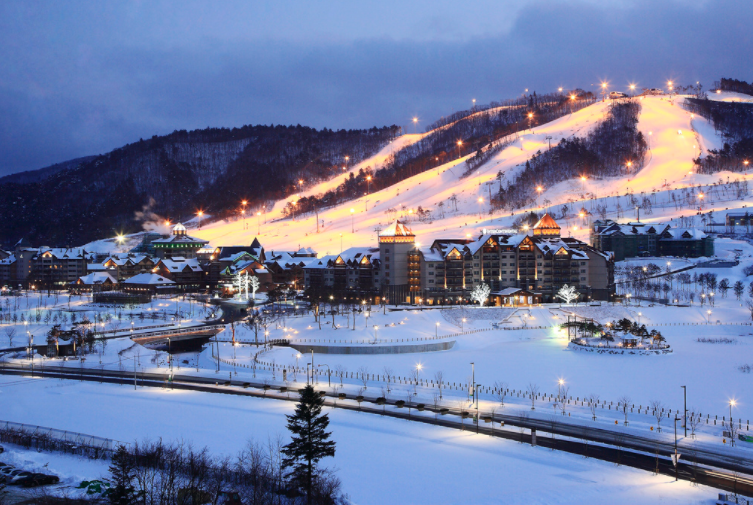Hard Olympic Security Choices: What to Watch for in Pyeongchang
The Olympic games are more than just sport.
The 2018 Winter Olympics in Pyeongchang, South Korea have begun. For two weeks, athletes from around the world will careen down mountains and glide on mirror-perfect ice. But as always, global politics–and the military and security threats behind those politics–lie just beneath the sporting surface.

Published by The Lawfare Institute
in Cooperation With

The Olympic games are more than just sport.
The 2018 Winter Olympics in Pyeongchang, South Korea have begun. For two weeks, athletes from around the world will careen down mountains and glide on mirror-perfect ice. But as always, global politics–and the military and security threats behind those politics–lie just beneath the sporting surface.
From the flag of Korean unification that flew over North and South Korean athletes to Vice President Mike Pence sitting near Kim Jong Un’s sister at the opening ceremonies, these Olympics have already highlighted a variety of national security choices. There are three international security matters in particular vying for Olympic gold in the Pyeongchang games: North Korea-South Korea relations, the repercussions of the Russian doping scandal, and hacking campaigns currently targeted at participating states and organizations.
The games, to start, take place against the backdrop of heightened tensions on the Korean peninsula, threats of nuclear strikes and “fire and fury,” and consequent fears of North Korean disruption of the games themselves.
But on Jan. 1, Kim Jong Un announced that he wanted to send a North Korean delegation to this year’s Winter Olympics. South Korea and North Korea worked furiously to devise an agreement resulting in the following terms: 22 athletes from North Korea are competing, 230 cheerleaders and supporters are accompanying them, and most notably, North Korea and South Korea entered the Olympic arena this morning under the Korean Unification Flag as a single delegation. The image of the flag itself has been a matter of contention: an early draft of the flag flown in an Olympic preparatory match included an image of the disputed islands known as the Liancourt Rocks. The islands were removed from the flag before the opening ceremony. South Korean President Moon Jae-in will have lunch with North Korean athletes and Kim Yo Jong, Kim Jong Un’s sister, who is the first member of the ruling family to visit South Korea since the Korean War. North Korea has also sent its ceremonial head of state, President Kim Yong Nam.
Some commentators interpret this symbolic move as substantive rapprochement, for better or for worse. That’s probably overstating the matter, but it certainly lessens the possibility of North Korean disruption of the games.
This isn’t the first time the Koreas have used sporting events to facilitate reunification discussions and deescalation of tensions. In 1991, North and South Korea signed a treaty re-establishing communication channels and creating some commitments of nonaggression. At the same time, the Koreas sent a unified team to the World Table Tennis Championships. In 2000, the two countries marched under the same Korean Unification Flag at the Sydney Olympics and in the 2006 Winter Olympics in Torino. But the compromise struck for the current Winter Olympics is the first attempt to bridge the sporting divide between the two Koreas since 2006—the same year that North Korea began testing its nuclear arsenal.
So, why now? Best guesses focus on South Korea’s key concern: being in North Korea’s crosshairs while President Trump is rattling his sabers. The Olympics give both Koreas an opportunity to take control of the public diplomacy. For President Moon Jae-in of South Korea, the probability of being attacked by North Korea rises and falls with the capriciousness of the United States government’s—more accurately: the president’s—bellicosity. Local efforts to stabilize the peninsula are efforts well spent from Moon’s perspective.
The North’s perspective is, as always, a little harder to glean. There has been some speculation that North Korea is reaching out because Kim Jong Un is feeling the bite of recent sanctions and is thus offering a charm offensive to counterbalance the missile threats. Likely adding to the North’s anxiety, Vice President Pence has also alluded to a new round of “the toughest and most aggressive . . . economic sanctions on North Korea ever.” Pence emphasized that the United States will “continue to isolate North Korea until it abandons its nuclear and ballistic missile programs once and for all”—a bleak prospect indeed. Furthermore, North Korea is clearly seeking to forge a warmer relationship with South Korea, putting distance between the South and the United States. The recent disagreements between President Moon and President Trump are not just about military and diplomatic matters vis a vis the North. They are also about economic and trade matters. President Moon’s belief that he holds a “veto” over any American preemptive military action is in direct opposition to the Trump administration’s stance on its latitude to conduct military operations in the region. As one New York Times article suggests, making nice to the South could be North Korea acting “in the hope of driving a wedge into [South Korea’s] seven-decade alliance with the United States.”
The United States, like the Koreas, has not missed the opportunity the games present to make its own political points about the politics of the Korean Peninsula: Fred Warmbier, the father of Otto Warmbier—who recently died following imprisonment in the North—has accompanied Pence to South Korea. Reports from opening ceremonies also paint a picture of Pence publicly avoiding the North Korean contingent, quickly leaving a reception in which North Koreans were present and avoiding a handshake with Kim Yong Nam.
While the choice to accommodate North Korean participation in the Olympics reduces the likelihood of the North attacking the games in some fashion, it also creates its own security dilemmas. South Korea had to grant the North Koreans an exception to its ban on North Korean ships in South Korean waters in order to allow the ferry delivering a number of musicians, dancers and singers to the Olympic ceremonies—a ban enacted in response to the 2010 sinking of a South Korean military vessel by a North Korean torpedo. On top of the exception to the ban, the North Korean ship requested fuel, which sparked debate about whether the provision of fuel to the North Koreans would violate a United Nations resolution limiting fuel exports to the North. Complicating things further, Samsung, a South Korean company, donated cell phones to Olympic athletes and officials. There is now considerable consternation as to whether giving North Korean athletes cell phones would violate United Nations sanctions on exporting luxury goods to North Korea, or prohibitions on goods that could be used for military ends. Even hockey sticks fall under the luxury good ban, making it necessary for the North Korean hockey players to return their hockey sticks to the International Ice Hockey Federation before they head home. North Korean athletes cannot wear uniforms made by United States companies because of American sanctions.
And that’s just the Korea stuff.
Then there’s Russia. In December 2017, the International Olympic Committee (IOC) banned Russian athletes from competing in the Pyeongchang olympics unless they can prove that they are clean. This followed the Russian covert action during the Sochi games in 2014 to subvert the international drug testing regime—a matter detailed in the recent film Icarus, which Benjamin Wittes reviewed here.
The IOC has made some exceptions. The 168 athletes who will be allowed to compete are labeled “Olympics Athletes from Russia” and compete under a neutral flag. The Russian anthem will not be played should any of them received a medal. On Jan. 29, Putin said publicly, “There were instances of doping use, true. I want the audience to know this and the whole country to know this . . . there are many such examples around the world, but no one is making a big show of it.”
The security angle here is complicated. On the one hand, the matter exposed a complex intelligence operation directed against the integrity of the international drug testing system that was supposed to keep the games honest. In addition, the response has significantly offended Russia and is keeping a lot of Russian athletes from the competition. The repercussions are, at this stage, unclear—except for the hacking.
The cybersecurity company McAfee recently uncovered a cyber operation, dubbed Operation GoldDragon, attacking South Korean organizations related to the Winter Olympics. McAfee believes the attack came from a nation state that speaks Korean, although it has no definitive proof that this is a North Korean operation. The victim organizations include ice hockey teams, ski suppliers, ski resorts, tourist organizations in Pyeongchang, and departments organizing the Pyeongchang Olympics.
Meanwhile, a Russia-linked cyber attack has already stolen and leaked documents from other Olympic organizations. The so-called Fancy Bear group, or APT28, began its operations in late 2017—according to Trend Micro and Threat Connect, two private cybersecurity firms—eventually publishing documents in 2018 outlining the political tensions between IOC officials and World Anti-Doping Agency (WADA) officials who are policing olympic athletes. It also released documents specifying exceptions to anti-doping regulations granted to specific athletes (for instance, one athlete was given an exception because of his asthma medication). The most recent Fancy Bear leak exposed details about a Canadian pole vaulter’s positive results for cocaine. This group has targeted WADA in the past, specifically during the 2016 Rio de Janeiro Olympics. Assuming the attribution is right, the action appears to be Russian retaliation for the punitive steps against Russia.
A senior analyst at McAfee warned that the Olympics may experience more cyber attacks before closing ceremonies. A researcher at ThreatConnect asserted that organizations like Fancy Bear have no reason to stop operations just because they’ve already stolen and released documents. Even the United States Department of Homeland Security has issued a notice to those traveling to South Korea to remind them to protect themselves against cyber risks.
Let the Olympic Games begin!





